|
-
|
- title:
|
- Sentimento
|
- release date:
|
- 2002
|
- record company:
|
- Philips
|
- order number
|
- CD: 470 400-2
- MC: 470 400-4
-
- UK/JAPAN only:
- CD 473410-2
- MC: 473 410 -4
- Limited edtion: 300 398-0
-
-
|
- Sentimento
- ... is a fantasy of dreams and love; the
tenderness and passion of love’s pleasure; and the
melancholy and tragedy of love’s pain.
It encompasses all the emotions of being in
love. This
is a very beautiful and romantic collection of music.
- (Andrea Bocelli)
-
-
- Tracklisting
with audiofiles from decca classics (click on the track!)
Oh
quand je dors;
Liszt
unreleased:
"oh
quand tu dors ..."
|
-
- Recorded
with the London
Symphony Orchestra at the BBC's London Studios der BBC, Autumn
2000
-
- Andrea Bocelli, tenor
-
- Lorin Maazel, solo violin
und orchestrator
- The
violin used by Maazel for this recording dates back to Cremona,
Italy 1722 – the home of the renowned Antonius Stradivarius.
For many years it was the solo instrument of the famous
virtuoso, Alexandre Artot (Alexandre Joseph Montagney Artot,
born 1815 in Brussels, died 1845 in Paris), hence its name,
The Artot.
After changing hands many times, it has since been
acquired by Maestro Maazel.
It is one of the most beautiful violins of the
Stradivarius Golden Period, its tone is of exquisite quality
and it possesses great carrying power.
-
- all
you need to know about Sentimento and much more at
|
|
|
 |
-
- Andrea Bocelli and Lorin Maazel performing at the launch party for Sentimento, Institute of Directors, London, 14 October 2002
-
|

|
|

|
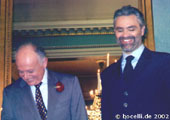
|
|
|
pictures
from two more launches:
|
 |
in
Milan
at October
30th... |
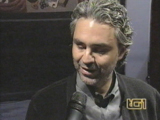 |
|
|
Vincenzo Mollica's
interview with Andrea Bocelli for RAIuno
Andrea plays "Sogno
d'amore" (Liebestraum) at the piano.
Andrea Bocelli: I got
hold of a version by Tito Schipa, but the lyrics were very
sad. It spoke about tombs, graves, etc. So, since it sound
good - the CD speaks instead of love - I thought I'd redo
the lyrics from , since it sound good - the CD speaks
instead of love - I thought I'd redo the lyrics from zero.
Vincenzo
Mollica: You
redid it yourself?
AB:
Yes, I did it myself. I wrote something that went well with all the rest
of the album.
VM: Will you let us
hear a little of the beginning of this thing you did?
AB: One thing that it
says: (he begins to sing) "Vorrei ancora un'attimo
soltanto per il sogno mio d'amor," etc.
VM:
Bocelli - songwriter. It's good news.
AB: No, no, songwriter
no, but...
(Clip of Carlo
Bernini,
an English violinist and Andrea singing "La serenata.")
AB: I think that music
and particularly song are made for the purpose of love. In
short, love is the motive for many immortal pieces of
music.
VM: Also maybe in
life...
AB: Sure! Don't you
feel it? (laughs)
transcript:
A. Eywo, translation: M. Morgan
|
|
|
|
|
- ...and
|
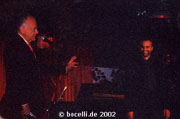 |
in
New York City at November 4, 2002 |
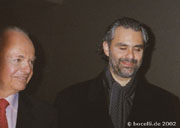 |
|
 |
|
|
|
|
|
- Extracts
from a conversation with Andrea Bocelli & Lorin
Maazel about Sentimento:
-
-
- AB:
“The original idea was to record a CD that
revived the fashion for performing violin/voice duets, a
long abandoned style of performance, which was so popular
many years ago with famous tenors like Caruso.
What we wanted to do was try this again with the
orchestra. Once
we had finalised the list of titles we realised in fact
that all these songs have a common theme, which is
Love.”
-
- LM:
“It had always been my dream to orchestrate this
extraordinary repertoire, giving the colour and the shine
and shimmer of an orchestral accompaniment as an
underpinning to the tenor voice, plus the violin obligatto
which for some reason, in terms of colour, seems to suit
the tenor voice so well.” (Lorin Maazel)
-
- AB:
“Working with Maestro Maazel was a pleasure and
an honour for me. I
already knew of his extraordinary talents as a composer
and orchestrator, through all he has achieved in his
remarkable career.many achievements.
Each of his orchestrations for Sentimento reflects
the style of the piece, each one radiates an extremely
different mood, which all helps to make this album very
varied.’
-
- LM:
“This music is very inspiring.
It makes everyone happy, it’s just beautiful to
listen to. There
isn’t a note that isn’t fun and isn’t a joy to the
ear, for musicians and the public at large.
It’s amazing, it’s the kind of music that
appeals to everyone.
And so our sessions were full of life and sparkle.”
-
- AB:
'Aranjuez has a haunting quality and a
sadness which is beautiful and entrances everyone who
hears it. Maestro
Maazel's magnificent orchestration gives Aranjuez the
grandeur it deserves, it was with great happiness that I
sang to it'
-
- AB:
“I decided to rewrite the text of the famous melody to
Lizst’s Liebestraum No 3, and all in all I’m very
happy. It is
like a dream come true when I least expected it.
Sogno d’Amore is a love song and it speaks of a
love affair that has ended but is still very much alive,
painfully alive in the protagonist’s mind.”
-
- LM:
‘I am very pleased with the way Sogno d’Amore
sounds. Liszt
was a marvellous orchestrator himself and I think he would
have been very pleased with what we did.’
-
- AB:
“Plaisir D’Amour is very popular for the
simplest reason that it’s extremely beautiful and a
thing of beauty is a joy forever.
Beautiful things, like all the wonders of this
world, earn their place in history and are forgotten by
no-one.”
-
- LM:
“Plaisir d’Amour is one of those songs that
typifies the whole collection of songs that we’re
offering. It’s
about a moment of joy and passion and then it’s gone.
Love is passing, like everything else, like life
itself. And Andrea has that quality in his voice and I think perhaps
the violin I’m playing, which is an old Stradivarius,
which has a very deep and sensuous sound, just suits the
material and subject matter.
In short, I think the combination of the two voices,
the voice of the violin I have the pleasure of playing and
the natural instrument that is in Andrea’s throat, that
interaction is amazing….something very vibrant, very
intense and very passionate.”
|
-
|
- ANDREA
BOCELLI
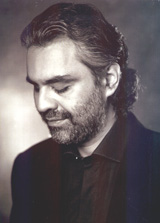
-
- "I
don’t think that one really decides to be a singer.
It’s decided for you, by the reaction of those around
you. Perhaps one shouldn’t say ‘listen to me, I want
to sing for you’, but if people say ‘please sing for
us’, well...."
- A
passionate desire for Andrea Bocelli’s voice has spread
across the world like wildfire. For Andrea Bocelli
possesses a truly remarkable voice. A voice as palpably
powerful, as it is almost ethereal. Not simply an
extraordinary voice which displays such power and
fragility, but a potent instrument of emotion and
sensitivity, which touches the heart, like music itself.
Andrea
Bocelli’s voice has made him an international phenomenon.
- Andrea
was born in 1958, in Lajatico, rural Tuscany. He cannot
remember life without a passion for music. He recalls his
early fascination with the great Italian tenors, such
talents as Del Monaco, Gigli and especially his idol
Franco Corelli. Enflamed by the music of the opera,
Andrea’s lifelong dream and ambition was to become a
great tenor, and the great operas were learnt by ear and
heart. Approaching his teens Andrea won a number of
singing competitions. However as adult life approached,
youthful ideals of a life devoted to music were to be
undermined by doubts and more down-to-earth concerns.
- Andrea
travelled to Pisa to attend university, taking a degree in
Law. Throughout, he enjoyed playing in local piano bars,
performing the classic tunes of such vocal greats as
Sinatra, Aznavour and Piaf. Occasionally, Andrea’s
deepest musical passions were revealed with the
performance of a favourite aria.
- Learning
that his childhood idol Franco Corelli was to take master
classes in Turin, Andrea apprehensively approached the
maestro. Remarkably the first aria Andrea sang for the
great tenor was from Puccini’s La
Bohème, his favourite opera from his youth and the
first complete opera he has now recorded so many years
later. Corelli, recognising a natural beauty in the voice,
which recalled qualities of several legendary Tuscan
tenors, took on the young man as a pupil and his legal
career was suspended. Life was now devoted to music
studies by day and performing in piano bars by night.
- In
1992, Italian rock star Zucchero required a tenor to
assist in the preparation of a demo of a unique duet,
"Miserere",
to be sung with the great Luciano Pavarotti. After
fruitless auditions, a young man performing in local piano
bars appeared and captured the very essence of the song.
Italian music industry figure Michele Torpedine flew to
Philadelphia to play "Miserere"
to Pavarotti. The great man was stunned by the way the
tenor took to the song.
- Back
in Italy, Andrea was approached in 1993 by Caterina
Caselli Sugar, president of the Sugar label, one of the
country’s longest established music companies, when she
heard him singing "Nessun
dorma" at a private party. She invited Andrea to
visit her office, to hear an unpublished composition
entitled "Il
mare calmo della sera" and insisted that the song
must be recorded by his beautiful and powerful voice.
- For
the following years, Caterina, Michele and others worked
hard to introduce this unique talent to the world,
including securing an invitation for him to take part in
the annual San Remo Song Festival, an event that demands
almost universal attention from the Italian media and
public.
- In
1996, the melody of "Con
te partirò" (written by Francesco Sartori and
Lucio Quarantotto) and its duet arrangement "Time
To Say Goodbye", with Sarah Brightman, beguiled
the European public. In 1997, the debut international
album Romanza on
Polydor/Sugar, enchanted first Europe, then countries
beyond. The passion of Romanza inflamed the world, Andrea’s voice touching hearts
unfamiliar with the Italian language, but utterly fluent
in the language of emotion.
- Alongside
his career in popular music, Andrea has pursued his
operatic passions with stunning success and remains one of
the most successful artists in the Philips catalogue. His
first operatic recording Viaggio
Italiano (which was made in 1995, but not released,
except in a few European territories, until a few years
later), was his personal tribute to the musical tradition
of the Italian tenor, not just the greats who inspired him,
but to the Italian immigrants and local heroes who
celebrated and popularised opera in their adopted
homelands. The 1998 debut international classical disc, Aria,
became one of the most successful classical albums ever,
dominating classical charts and sensationally scaling
international pop album charts. The success of Aria was surpassed by the follow-up Sacred Arias in 1999, conducted by Myung-Whun Chung, and consisting
of various sacred compositions by Bach/Gounod, Mozart,
Schubert and Rossini.
- In
autumn 2000, Andrea added two more classical recordings to
his discography, a selection of Verdi Arias
(Andrea’s tribute to the great composer whose centenary
of his death was commemorated in 2001) and a complete La
Bohème with Barbara Frittoli, both conducted by Zubin
Mehta. Indeed, this was a dream come true for Andrea who
fell in love with this opera the very first time he heard
it. He went on to record Verdi’s Requiem
with Renée Fleming, Olga Borodina and Ildebrando
D’Arcangelo, conducted by maestro Valery Gergiev, which
was released spring 2001and has since recorded Tosca,
Il Trovatore and very recently Pagliacci
and Cavelleria Rusticana for future release.
- More
and more of Andrea’s live performances are devoted to
classical music. Galas and concerts with the world’s
greatest operatic stars like Luciano Pavarotti, Dame Kiri
Te Kanawa and José Carreras have taken him to France,
England and Israel as well as throughout his native Italy
and to the Vatican. He has also broadened his stage experience with performances
of La Bohème, Werther, Macbeth, The
Merry Widow, L'Amico Fritz, and Verdi’s Requiem.
He is currently rehearsing and performing Madama
Butterfly in Torre del Lago, Italy.
- This
year, Andrea was awarded a highly-coveted UK Classical
Brit award for Outstanding Contribution, he has performed
for President Bush and sung with Pavarotti at the annual
Pavarotti & Friends concert.
- Despite
living in a world of frenetic change, Andrea approaches
life with a serene outlook, enjoying life’s simple
pleasures and undertaking each challenge with a will. Ever
optimistic, Andrea suggests that his philosophy on life
might be summed up by a quote by French novelist Antoine
de Saint-Exupery; "One only sees clearly with the
heart. What is essential is invisible to the eyes".
|
-
|
- Video Links (requires
real player!)
-
- Sentimento
Electronic Press Kit (60 secs) - LOW
SPEED
- Sentimento
Electronic Press Kit (60 secs) - HI
SPEED
-
|
|

